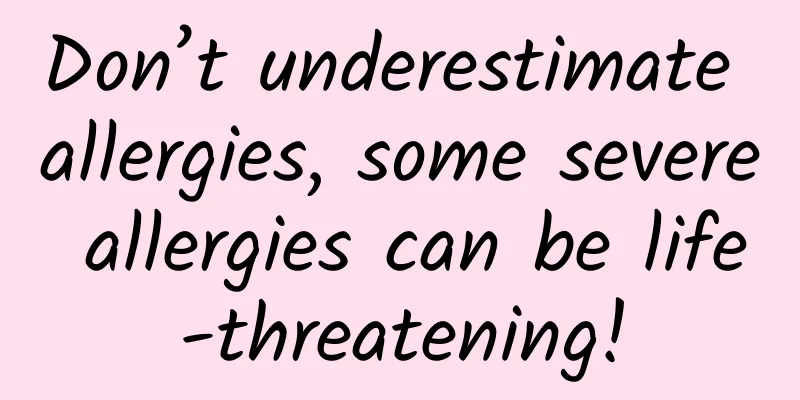Don’t underestimate allergies, some severe allergies can be life-threatening!

|
Sneezing, red eyes, runny nose Rash, itching, and chronic cough Most people think of allergies as the above symptoms No big deal It will be fine after a while It's really uncomfortable Take some medicine Can also control very well but Don't underestimate allergies Deaths from severe allergies are not uncommon 1. “Almost died” from allergies In April 2021, the Las Vegas Review-Journal reported a case of severe allergic reaction. An actress named Giacalone suffered an anaphylactic shock due to an allergic reaction to peanut butter pretzels. Due to improper rescue, she suffered permanent brain damage and was awarded nearly $30 million in compensation. Patient Xiao A also recounted an experience of "almost dying". Once, he suddenly developed swelling on his head and face after eating seafood products. "I seemed to have been hit by Harry Potter's bee sting curse, my limbs began to swell, and my whole body was covered with hives. The most terrifying thing was that my laryngeal edema appeared, and I instantly felt difficulty breathing, and a terrifying feeling of dying followed." Fortunately, Xiao A was sent to the hospital by his family in time. The doctor immediately began emergency treatment and gave him an injection of dexamethasone. Within 5 minutes of taking dexamethasone, Xiao A's hives gradually subsided and his difficulty breathing was somewhat relieved, but he still felt weak in breathing and heartbeat, and then lost consciousness. When he regained consciousness, he was already in the ward. The actress and patient A both experienced severe allergic reactions. Although they luckily survived, the allergies caused great trauma to them both physically and psychologically. This situation is very different from the allergies that most people see. So, can allergies really cause fatal consequences? The answer is: Yes! 2. Why are allergies life-threatening? Allergic reaction, also known as allergic reaction, is a reaction that occurs quickly after contact with allergens and affects a single system or the whole body. The patient's clinical symptoms are mainly manifested in the skin, respiratory, digestive and circulatory systems, and severe cases can be life-threatening. Allergy to certain drugs is the most common cause of allergic reactions, followed by allergic reactions caused by inhaled allergens and food allergens. Anaphylactic shock is a symptom caused by specific allergens that are generally harmless to the human body acting on patients with allergic constitutions. Such allergens are diverse and can act on different systems of the body, such as the respiratory system, digestive system, and blood circulation system. Usually, specific allergens will only cause allergic reactions in certain tissues and organs, and whether shock will occur is related to the differences in the patient's own constitution. Anaphylactic shock is a serious allergic disease. When the sensitized body comes into contact with the corresponding allergens again, mast cells and basophils in the blood and tissues release inflammatory mediators such as histamine and bradykinin, which cause dilation of small blood vessels throughout the body and increase vascular permeability, leading to a systemic rapid allergic reaction dominated by insufficient peripheral circulation perfusion, also known as type I hypersensitivity reaction. In severe cases, in addition to shock, there are often signs such as laryngeal edema, bronchial spasm, and pulmonary edema. The cause of death is the sudden inability to measure blood pressure, followed by respiratory and cardiac arrest and severe laryngeal edema leading to suffocation. Once a patient has anaphylactic shock, on-site rescue is critical. This disease is rapid and dangerous. If the treatment is timely and appropriate, the patient's symptoms will be relieved quickly. However, if emergency treatment is not given, it often leads to the patient's death. 3. The road to fighting allergies is long and difficult In recent years, the number of allergy sufferers has increased. According to conservative estimates, global allergic diseases are one of the most widespread epidemics in the 21st century. Western countries even predict that in 20 years, half of the human population will suffer from allergic diseases. Patients with allergic diseases should maintain an optimistic attitude. Just like two armies fighting, only by maintaining the confidence of victory can we fully mobilize the enthusiasm for fighting. In the face of disease, a good attitude and positive actions are equally important. Usually, preventive measures should be taken to avoid the occurrence of allergies; once an allergy occurs, active and timely medical treatment is a necessary measure for self-protection. How to build a "health fortress" for allergy patients? First of all, the key to dealing with allergic diseases is prevention. We should develop good living habits, repair the damaged human immune system, and reshape the immune balance. Through allergen testing, we can determine the types of major allergens. Commonly used clinical detection methods include skin prick test, patch test, and serum-specific IgE test. Patients can avoid allergens according to the type of allergens, and try to avoid eating foods that cause allergies; for inhaled allergens (such as dust mites, mold, cockroaches, pet dander, etc.), it is necessary to keep the room cool, ventilated and clean, and wet mops and rags can be used to clean the room; when going out during the spring and autumn pollen season, wear protective masks and protective glasses. Secondly, for some unavoidable allergens, such as dust mites, specific immunotherapy, commonly known as desensitization therapy, can be carried out under the guidance of an allergist. Many studies at home and abroad have confirmed that the "allergy march" is real, that is, the natural course of allergic diseases in children. Desensitization therapy is a causal treatment method, which is expected to change the natural course of allergies and prevent the development of allergic diseases. At the same time, those with severe allergic symptoms can use antihistamines, anti-leukotriene drugs, local glucocorticoids and other anti-allergic drugs for symptomatic treatment. In addition, studies have shown that maintaining the balance of intestinal flora and appropriate supplementation of vitamin D may be beneficial to the improvement of allergic diseases. Although the road to fight allergies is long and arduous, as long as we have firm confidence, scientific prevention and treatment, and persevere to the end, we will surely see the light of victory. |
<<: What triggered a dramatic decline in marine biodiversity 460 million years ago?
Recommend
Will a person be woken up by the urge to urinate during sleep? Will the bladder be ruptured by the urge to urinate?
Getting up every morning is a difficult thing for...
2022 Open Traffic Password Baidu Cloud Download
: : : : : : : : : : : : : : :...
The mysterious "water droplets" in cells have been discovered! Is this the "key" to conquering many difficult diseases?
Author: Duan Yuechu and Huang Xianghong According...
Revealing the secret of Toutiao’s user growth!
Toutiao has always been criticized for its vulgar...
WeChat cannot send videos over 25MB? Three tips to fix it
As we all know, WeChat has a limit on the size of...
Touch Technology's Chen Haozhi: Seize the market and build an ecosystem for common development
On October 28, the Cocos 2014 Developer Conferenc...
Mountain floods in Datong County, Qinghai Province triggered mudslides. Why is the “last mile” forecast and rescue still a problem?
Heavy rainfall in Datong County, Qinghai Province...
How to choose a children's electric toothbrush? At what age can children use it? An article will solve your confusion
How to choose a children's electric toothbrus...
The similarities and differences between Web front-end development and iOS terminal development
[[125065]] language As user-oriented programs, th...
CAC2.0 "From Picking Up Girls to Long-term Relationships" - Tips for Picking Up Girls
Course Contents: 1. Long Frame vs Short Frame.mp4...
How to design new media content to be more attractive?
When it comes to new media operations , content i...
Tiktok overseas version short video operation tutorial (Apple/Android), help domestic users to watch the overseas version of TikTok
Tiktok overseas version short video operation tut...
If you drop a bird on the moon, how will it take off?
Follow Captain Da Shanzha Wan Check out more hard...
A risk-free, zero-cost charlatan project that uses people's beliefs to make money
The word "shengun" has existed since an...
QQ is openly building its defenses while Alipay is secretly making moves. Who will win in this year's red envelope battle?
Will the three-year Spring Festival red envelope ...

![[Actual test] Only 1 degree of electric hammer air purifier in 5 days: a powerful energy-saving small cyclone](/upload/images/67f09c3a0ceaa.webp)







